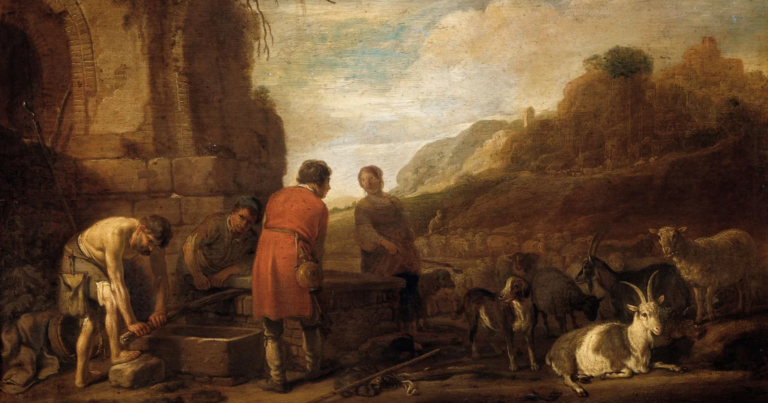The Gospels provide numerous instances that demonstrate Jesus’s leadership.
They present Jesus as a transformative leader whose actions and teachings have reshaped the world.
In general, Jesus’s leadership is characterized by his ability to inspire change, develop followers into leaders, and consistently demonstrate compassion and empathy.
In this article, I’ll present 7 passages from the Gospels that show Jesus as a transformative leader.
Through these instances, we can better understand why Jesus’s teachings remain potent, guiding countless individuals toward personal and spiritual growth.
1. Jesus washes the disciples’ feet
“I am the good shepherd. The good shepherd lays down his life for the sheep”
John 10:11
This moment, found in John 13:1-17, embodies Jesus’s transformative leadership through servant leadership.
Here, Jesus, the teacher and leader, kneels before his disciples to wash their feet – a task typically reserved for the lowest of servants.
Breaking away from conventional leadership norms, Jesus exemplifies humility and service. He challenges societal hierarchies and models a leadership style that values serving others over personal power or status.
His actions resonate with a profound message – leaders should be willing to serve those they lead.
The reason I believe this moment is transformative is that it’s not just for the disciples. Instead, it is also for us as readers.
It encourages us to question our understanding of leadership and prompts us to embrace humility and service in our interactions with others.
Simply put, this instance showcases how Jesus’s leadership can inspire personal transformation and growth.
2. The feeding of the five thousand
“But I tell you, love your enemies and pray for those who persecute you.”
Matthew 5:44
A remarkable instance of Jesus’s transformative leadership is found in the miracle of feeding five thousand people, as depicted in all four Gospels (Matthew 14:13-21, Mark 6:31-44, Luke 9:10-17, and John 6:1-15).
In this instance, Jesus transforms a meager offering of five loaves and two fish into a feast for thousands.
This moment highlights how Jesus leads with compassion and faith.
He sees beyond the immediate scarcity and taps into divine provision to meet the needs of the multitude.
In his actions, you can observe a leadership style that is resourceful and dependent on God’s providence.
More than just a miraculous event, this moment presents a transformative lesson for us. It encourages us to trust in God’s provision and to approach our challenges with faith, even when resources seem scarce.
And let’s be honest: with God, impossibilities can turn into possibilities.
3. Jesus and the Samaritan woman at the well
“My command is this: Love each other as I have loved you”
John 15:12
We often find transformative leadership in unexpected encounters. One such moment is Jesus’s interaction with the Samaritan woman at the well, found in John 4:1-42.
Here, Jesus breaks societal norms by engaging in a deep theological discussion with a woman, and moreover, a Samaritan – a group despised by the Jews.
In this instance, Jesus’s leadership embodies inclusion, respect, and acceptance.
Despite societal prejudices, he acknowledges her worth and offers her ‘living water’ – eternal life.
This moment displays how Jesus leads with empathy and understanding, acknowledging her struggles while offering her spiritual truth.
For us, this moment prompts reflection on our biases and assumptions.
Like Jesus’s transformative leadership, we too can strive to create a positive impact through empathy and understanding.
4. The parable of the Good Samaritan
Ever wondered how Jesus taught transformative leadership through stories?
Look no further than the parable of the Good Samaritan, found in Luke 10:25-37.
In this story, Jesus challenges us to redefine our understanding of ‘neighbors’ and urges us to demonstrate compassion, even towards those who are different from us.
In the parable, a Samaritan, who was generally despised by Jews, becomes the hero by showing compassion to a robbed and beaten man left for dead.
He does so while a priest and a Levite, both respected figures in Jewish society, pass by without helping.
Interestingly, in this parable, Jesus turns societal norms upside down by making a socially outcast Samaritan the hero of the story.
5. Jesus’s forgiveness towards the woman caught in adultery
In John 8:1-11, we witness Jesus’s transformative leadership at play in a tense situation involving a woman caught in adultery.
The religious leaders were ready to stone her, adhering to the law of Moses.
However, Jesus’s response was a stunning display of grace, empathy, and wisdom.
Instead of condemning her, Jesus challenged those without sin to cast the first stone. This moment exhibits:
- Jesus’s courage to stand against societal norms
- His wisdom in diffusing volatile situations
- His grace and compassion towards the marginalized
This moment serves as a striking reminder of Jesus’s leadership style that values understanding and forgiveness over judgment and punishment. It prompts us to reflect on our own actions and attitudes towards others.
6. The Sermon on the Mount
One of the most significant moments in the Gospels that showcases Jesus’s transformative leadership is the Sermon on the Mount, found in Matthew 5-7.
Here, Jesus delivers a comprehensive guide on how to live a righteous and fulfilling life.
Jesus presents a radical reimagining of the law and societal values. He emphasizes internal purity over external rituals, love over hate, and humility over pride.
He challenges us to strive for a higher standard of righteousness that goes beyond mere legalistic adherence.
These teachings have left an indelible mark on countless lives throughout history, inspiring personal transformation and spiritual growth.
For us, the Sermon on the Mount serves as a blueprint for living a life marked by love, humility, and righteousness – core values of Jesus’s transformative leadership style.
7. Jesus’s interaction with Zacchaeus
Imagine being disliked by everyone around you due to your profession, and then having someone not just acknowledge you but also choose to dine at your house.
This is precisely what transpires in the encounter between Jesus and Zacchaeus, a tax collector, in Luke 19:1-10.
Despite Zacchaeus being a social outcast due to his role as a tax collector, Jesus does not shun him. Instead, he invites himself to Zacchaeus’s house for a meal.
This act of acceptance leads to Zacchaeus’s transformation – he vows to give half of his possessions to the poor and repay four times the amount if he has cheated anyone.
This moment sheds light on how Jesus’s transformative leadership prioritizes acceptance and love over judgment. It illustrates that no one is beyond redemption and that change can be sparked through understanding and kindness.
This story encourages us to approach others with empathy, regardless of their past actions or societal status.
Leaders incorporating Jesus’ qualities
Now let me present some modern-day leaders who incorporated Jesus’ qualities.
Many leaders, whether in religious, business, or political contexts, have incorporated the qualities of Jesus’ leadership style into their own.
These leaders demonstrate servant leadership, empathy, and effective communication in their roles.
Martin Luther King Jr., for instance, was a notable leader who embodied many of Jesus’ leadership qualities. He served his followers by fighting for their rights and freedoms.
His empathetic approach toward those who were marginalized greatly influenced his followers and garnered support for his cause.
Moreover, his eloquent speeches effectively communicated his vision and inspired millions.
In the realm of business, Richard Branson, the founder of the Virgin Group, is known for his servant leadership.
He often emphasizes the importance of looking after employees and putting their needs first. This approach has not only made Virgin a successful company but also one that is loved by its employees.
But these are just two examples of leaders who have incorporated Jesus’ leadership qualities into their own styles.
Transformative leadership through the lens of Jesus
The Gospels provide a rich tapestry of moments that showcase Jesus’s transformative leadership.
These instances, though steeped in historical and cultural context, continue to resonate with us today, offering timeless lessons on empathy, humility, compassion, and servant leadership.
- The humility shown when Jesus washes the disciples’ feet
- The faith and resourcefulness seen in the feeding of the five thousand
- The empathy and respect displayed towards the Samaritan woman at the well
- The radical reimagining of societal norms in the parable of the Good Samaritan
- The grace and wisdom shown in dealing with the woman caught in adultery
- The comprehensive guide to righteous living given in the Sermon on the Mount
- The acceptance and kindness shown towards Zacchaeus, leading to his transformation
These moments compel us to reflect on our own actions and attitudes. They challenge us to consider how we can incorporate aspects of Jesus’s transformative leadership into our daily lives.
How can we lead with more empathy, humility, and compassion? How can we inspire change in ourselves and those around us?
The answer lies in studying these moments and learning from them, taking another step in our spiritual growth.














